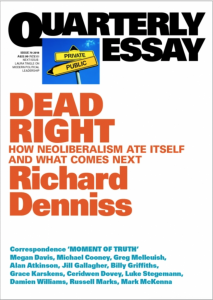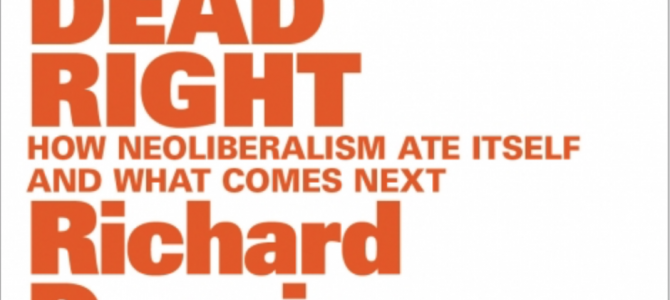 In the recent Quarterly Essay, in which he attempts to demolish the prevailing neoliberal status quo, economist Richard Denniss misses the mark in two important respects. Firstly, he dramatically overstates the population’s rejection of neoliberal ideas. Secondly, he underestimates the all-pervasive power of ideology. A careful re-reading of Marx and Althusser, would help him to understand how the neoliberal ideology insinuates itself into every aspect of our personal and social relations. A brief examination of the ways in which neoliberal thought arises in our everyday attitudes and decision making, in the dictates and orientation of our institutions, in the desires and aspirations of our selves, co-workers and students, reveals the ways in which our realities are coopted and formed through ideology. Denniss’s intervention is an important first step, but to reverse four decades (I think his historical calculation is wrong by nearly 10 years) of indoctrination will take more than overoptimistic journalism. However, in Denniss’s defence, the method of stating as facts, states of affairs that are clearly not supported by the evidence, has been a potent tool in the arsenal of the powerful, and he co-opts this strategy effectively in his essay.
In the recent Quarterly Essay, in which he attempts to demolish the prevailing neoliberal status quo, economist Richard Denniss misses the mark in two important respects. Firstly, he dramatically overstates the population’s rejection of neoliberal ideas. Secondly, he underestimates the all-pervasive power of ideology. A careful re-reading of Marx and Althusser, would help him to understand how the neoliberal ideology insinuates itself into every aspect of our personal and social relations. A brief examination of the ways in which neoliberal thought arises in our everyday attitudes and decision making, in the dictates and orientation of our institutions, in the desires and aspirations of our selves, co-workers and students, reveals the ways in which our realities are coopted and formed through ideology. Denniss’s intervention is an important first step, but to reverse four decades (I think his historical calculation is wrong by nearly 10 years) of indoctrination will take more than overoptimistic journalism. However, in Denniss’s defence, the method of stating as facts, states of affairs that are clearly not supported by the evidence, has been a potent tool in the arsenal of the powerful, and he co-opts this strategy effectively in his essay.

